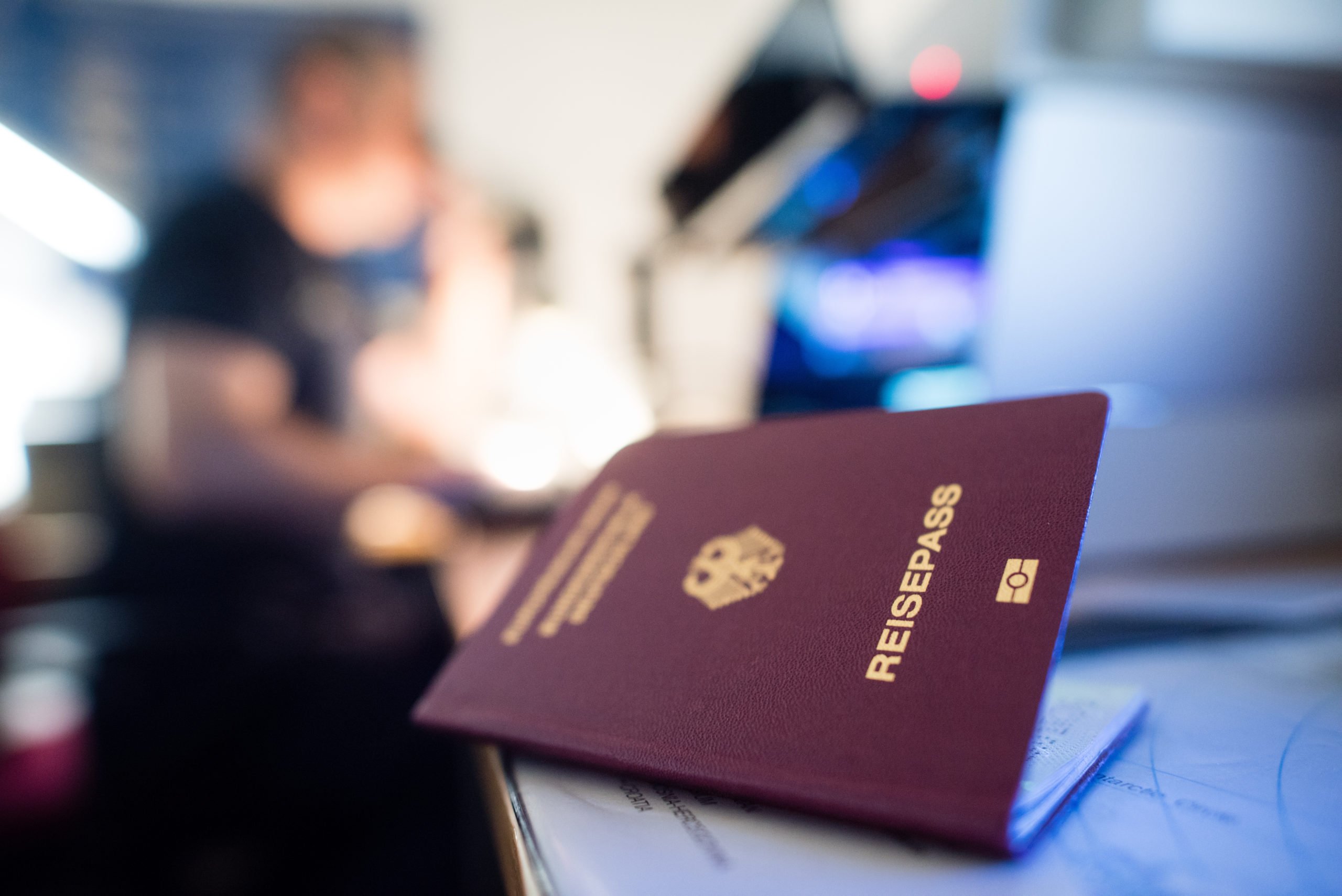'So many hurdles': How Americans in Germany are fighting to renounce US citizenship

Facing increasingly tough tax rules while living abroad, an increasing number of US citizens are choosing to renounce their old passport and become German. But as one woman found out, getting rid of US citizenship isn't as simple as it sounds.
After living in Germany for more than 30 years, Alison*, a US citizen in her early 60s, decided it was finally time to become German.
Having grown increasingly disillusioned with American politics, she had been thinking about taking the plunge for at least a decade, but was concerned about giving up her US passport in case her elderly parents needed her support.
After her parents passed away, she made the decision to submit her application for German citizenship, ticking a box to say she was happy to give up her US nationality and submitting proof of language skills, integration and residency in the country.
Then, just one more hurdle remained: booking an appointment at the US Consulate General in Frankfurt and renouncing her old citizenship.
It was at this point that things started to become difficult.
"I’ve completed all the requirements needed to get German citizenship and I have the official permission - but I can’t get an appointment," she told The Local.
"There’s no telephone number that I’ve been able to find where I can make an appointment and when I go on the website, there’s no option to make an appointment to give up citizenship."
The issue has brought Alison's life to a standstill for several months, leaving her caught in a catch-22: Germany insists on her giving up her US citizenship, and America is making it impossible to do so.
"This has been going for at least a year," she explained, adding that she had been thinking about it for around a decade.
"I've been pushing and pushing for various reasons, and I really want to get this finished but there are just so many blockades."
READ ALSO: ‘Two years is normal’: How Germany’s citizenship process leaves foreigners hanging
'Not scheduling appointments'
The Local put in a call to Frankfurt's Consulate General to ask about the possibility of booking appointments for the renunciation of citizenship.
We were forwarded on to the Citizenship Advice Service where an automated message stated that no citizenship advice was currently being given out over the phone.
Having trawled through the website, a page with information on renouncing citizenship explained that, "in accordance with United States Department of State worldwide regulations in place due to Covid-19 and in line with efforts by the Government of Germany to prevent the spread of Covid-19, the Consular Section of the US Consulate General in Frankfurt has temporarily restricted some routine consular processing."

The American flag flies outside of the US Consulate General in Frankfurt. Photo: picture alliance / Frank Rumpenhorst/dpa | Frank Rumpenhorst
"US Consulate General in Frankfurt is currently not scheduling citizenship renunciation appointments," it added.
The issue appears to date back to March 2020, when the US State Department ordered its embassies around the world to limit its services to citizens in those countries.
As Alison found out, a number of other services have since resumed - but renouncing citizenship isn't one of them.
READ ALSO: How Americans in Europe are struggling to renounce US citizenship
The Local has requested information from the Frankfurt Consulate General on when this service will be resumed, given that most European nations - including Germany - have dropped almost all of their Covid-19 restrictions in recent months.
We have not yet received a response.
'Erosion of rights'
For many Americans - including Alison - the reasons for renouncing citizenship have grown in recent years.
In 2010, the US government introduced a piece of legislation called the Foreign Account Tax Compliance Act (FATCA), which forces foreign banks to pass on information about their American customers' accounts to the Internal Revenue Service (IRS).
European financial institutions were given a deadline of 2020 to start complying with FATCA, and as this deadline approached, many Americans suddenly received letters telling them their bank accounts were being closed.
Others, including Alison, started to face other restrictions on their financial activities - like a ban on the holding of stocks and shares.
"I’ve found in the last five, six years, there’s been a real erosion of my rights here – not just in Germany, but in Europe as a whole," Alison said. "This is not due to the EU, it’s due to the American banking regulations, because no bank wants to give any sort of account to an American, because the IRS has threatened to sue any worldwide bank that gives an account to an American who may not pay taxes."
Though Alison was permitted to keep her bank account of 30 years, she was told she had to sell the small amount of stocks that she'd been holding in Germany.

A woman withdraws cash from an ATM. Over the past few years, Americans have had difficulties accessing financial services in Europe. Photo: picture alliance/dpa/dpa-tmn | Benjamin Nolte
Then she was told she couldn't have power of attorney over her husband's or children's assets.
"It’s absurd," she said. "And in fact, I earn zero. I retired early because my husband and I agreed we wanted to travel after he retired."
READ ALSO: Why are Americans being turned away from German banks?
Her children, who have joint US and German citizenship, have also faced financial issues due to FATCA.
When her son starting studying at the prestigious Institute of Technology in Zurich, Switzerland, he went from bank to bank attempting to set up a new account.
"He got rejected over and over," Alison said. "They just absolutely refused to give him an account even though he was a student earning nothing."
Both her son and her daughter were also required to sell their stocks in a German bank, which they invested after receiving a small inheritance from their grandmother.
They are now both considering renouncing their US citizenship.
Caught between laws
The de facto block on giving up American citizenship has impacted people across the world, keeping them trapped with a passport (and inside of a tax system) that they no longer want to be associated with.
In Germany, the issue is even more pressing, since delays in giving up citizenship also mean delays in the naturalisation process.
Though the new traffic-light coalition of the Social Democrats (SPD), Greens and Free Democrats (FDP) has promised to overturn the ban on dual nationality sometime within the next four years, Alison's situation is too urgent to wait that long.
READ ALSO: What’s the latest on Germany’s plan to change dual citizenship laws?
Her husband is now in his 70s and wants her to have power of attorney so that she's able to access his finances if anything happens to him.
"He's been a major force in pushing me to do this," he said. "As you get older, you don’t want to be left in a situation when someone is ill and needs care and you don’t have the money to pay for it."
The only way to do this is for her to give up US citizenship and become German, but at the moment she's caught between America's strict financial laws and German's strict citizenship laws.
There are some loopholes for getting dual nationality for people who, for example, are from countries that don't allow them to give up their citizenship. But it's unclear if this would imply in Alison's case and she says it would cost too much to hire a lawyer and "buy her way in".

A German passport. Germany's citizenship laws have compounded the problem for Americans like Alison. Photo: picture alliance/dpa | Matthias Balk
"That's a little bit unfair because isn’t the US, by not giving me an appointment, taking away my right to give up my citizenship?", she said.
According to the latest data from the Federal Office of Statistics, around 800 and 1,000 people annually from North America (Canada and the US) have generally opted to take German citizenship each year.
In the first three months of 2020 alone, 990 US citizens chose to become German. Though it's not clear how many of these gave up their US citizenship, the seeming rise in the numbers could be due to the difficulties posed by FATCA.
This would fit with the estimates of an international tax advisor in Poland who was quoted by several media outlets on the issue.
He believes that around 30,000 applications would have been submitted to renounce US citizenship since March 2020 if the embassies had been accepting applications. If this is true, the backlog will be getting longer by the day.
Two years since the pandemic arrived in Europe, life has mostly returned to normal - but for Americans wanting to give up their citizenship, there's nothing to do but wait.
Are you an American in Germany with similar worries? Get in touch by emailing [email protected]
* Names were changed to protect the interviewee's privacy.
Comments (1)
See Also
After living in Germany for more than 30 years, Alison*, a US citizen in her early 60s, decided it was finally time to become German.
Having grown increasingly disillusioned with American politics, she had been thinking about taking the plunge for at least a decade, but was concerned about giving up her US passport in case her elderly parents needed her support.
After her parents passed away, she made the decision to submit her application for German citizenship, ticking a box to say she was happy to give up her US nationality and submitting proof of language skills, integration and residency in the country.
Then, just one more hurdle remained: booking an appointment at the US Consulate General in Frankfurt and renouncing her old citizenship.
It was at this point that things started to become difficult.
"I’ve completed all the requirements needed to get German citizenship and I have the official permission - but I can’t get an appointment," she told The Local.
"There’s no telephone number that I’ve been able to find where I can make an appointment and when I go on the website, there’s no option to make an appointment to give up citizenship."
The issue has brought Alison's life to a standstill for several months, leaving her caught in a catch-22: Germany insists on her giving up her US citizenship, and America is making it impossible to do so.
"This has been going for at least a year," she explained, adding that she had been thinking about it for around a decade.
"I've been pushing and pushing for various reasons, and I really want to get this finished but there are just so many blockades."
READ ALSO: ‘Two years is normal’: How Germany’s citizenship process leaves foreigners hanging
'Not scheduling appointments'
The Local put in a call to Frankfurt's Consulate General to ask about the possibility of booking appointments for the renunciation of citizenship.
We were forwarded on to the Citizenship Advice Service where an automated message stated that no citizenship advice was currently being given out over the phone.
Having trawled through the website, a page with information on renouncing citizenship explained that, "in accordance with United States Department of State worldwide regulations in place due to Covid-19 and in line with efforts by the Government of Germany to prevent the spread of Covid-19, the Consular Section of the US Consulate General in Frankfurt has temporarily restricted some routine consular processing."

"US Consulate General in Frankfurt is currently not scheduling citizenship renunciation appointments," it added.
The issue appears to date back to March 2020, when the US State Department ordered its embassies around the world to limit its services to citizens in those countries.
As Alison found out, a number of other services have since resumed - but renouncing citizenship isn't one of them.
READ ALSO: How Americans in Europe are struggling to renounce US citizenship
The Local has requested information from the Frankfurt Consulate General on when this service will be resumed, given that most European nations - including Germany - have dropped almost all of their Covid-19 restrictions in recent months.
We have not yet received a response.
'Erosion of rights'
For many Americans - including Alison - the reasons for renouncing citizenship have grown in recent years.
In 2010, the US government introduced a piece of legislation called the Foreign Account Tax Compliance Act (FATCA), which forces foreign banks to pass on information about their American customers' accounts to the Internal Revenue Service (IRS).
European financial institutions were given a deadline of 2020 to start complying with FATCA, and as this deadline approached, many Americans suddenly received letters telling them their bank accounts were being closed.
Others, including Alison, started to face other restrictions on their financial activities - like a ban on the holding of stocks and shares.
"I’ve found in the last five, six years, there’s been a real erosion of my rights here – not just in Germany, but in Europe as a whole," Alison said. "This is not due to the EU, it’s due to the American banking regulations, because no bank wants to give any sort of account to an American, because the IRS has threatened to sue any worldwide bank that gives an account to an American who may not pay taxes."
Though Alison was permitted to keep her bank account of 30 years, she was told she had to sell the small amount of stocks that she'd been holding in Germany.

Then she was told she couldn't have power of attorney over her husband's or children's assets.
"It’s absurd," she said. "And in fact, I earn zero. I retired early because my husband and I agreed we wanted to travel after he retired."
READ ALSO: Why are Americans being turned away from German banks?
Her children, who have joint US and German citizenship, have also faced financial issues due to FATCA.
When her son starting studying at the prestigious Institute of Technology in Zurich, Switzerland, he went from bank to bank attempting to set up a new account.
"He got rejected over and over," Alison said. "They just absolutely refused to give him an account even though he was a student earning nothing."
Both her son and her daughter were also required to sell their stocks in a German bank, which they invested after receiving a small inheritance from their grandmother.
They are now both considering renouncing their US citizenship.
Caught between laws
The de facto block on giving up American citizenship has impacted people across the world, keeping them trapped with a passport (and inside of a tax system) that they no longer want to be associated with.
In Germany, the issue is even more pressing, since delays in giving up citizenship also mean delays in the naturalisation process.
Though the new traffic-light coalition of the Social Democrats (SPD), Greens and Free Democrats (FDP) has promised to overturn the ban on dual nationality sometime within the next four years, Alison's situation is too urgent to wait that long.
READ ALSO: What’s the latest on Germany’s plan to change dual citizenship laws?
Her husband is now in his 70s and wants her to have power of attorney so that she's able to access his finances if anything happens to him.
"He's been a major force in pushing me to do this," he said. "As you get older, you don’t want to be left in a situation when someone is ill and needs care and you don’t have the money to pay for it."
The only way to do this is for her to give up US citizenship and become German, but at the moment she's caught between America's strict financial laws and German's strict citizenship laws.
There are some loopholes for getting dual nationality for people who, for example, are from countries that don't allow them to give up their citizenship. But it's unclear if this would imply in Alison's case and she says it would cost too much to hire a lawyer and "buy her way in".

"That's a little bit unfair because isn’t the US, by not giving me an appointment, taking away my right to give up my citizenship?", she said.
According to the latest data from the Federal Office of Statistics, around 800 and 1,000 people annually from North America (Canada and the US) have generally opted to take German citizenship each year.
In the first three months of 2020 alone, 990 US citizens chose to become German. Though it's not clear how many of these gave up their US citizenship, the seeming rise in the numbers could be due to the difficulties posed by FATCA.
This would fit with the estimates of an international tax advisor in Poland who was quoted by several media outlets on the issue.
He believes that around 30,000 applications would have been submitted to renounce US citizenship since March 2020 if the embassies had been accepting applications. If this is true, the backlog will be getting longer by the day.
Two years since the pandemic arrived in Europe, life has mostly returned to normal - but for Americans wanting to give up their citizenship, there's nothing to do but wait.
Are you an American in Germany with similar worries? Get in touch by emailing [email protected]
* Names were changed to protect the interviewee's privacy.
Join the conversation in our comments section below. Share your own views and experience and if you have a question or suggestion for our journalists then email us at [email protected].
Please keep comments civil, constructive and on topic – and make sure to read our terms of use before getting involved.
Please log in here to leave a comment.